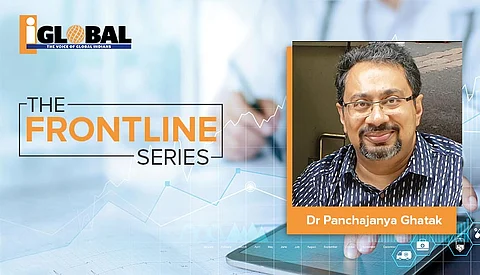

Summer is almost upon us. With all legally binding Covid restrictions now lifted, these active social months promise the most glorious time of the year. However, some recent developments have given healthcare experts reason to urge people not to be absolutely disarmed against Covid just yet.
According to reports, Covid-19 infections are once again showing a spike. The latest Office for National Statistics (ONS) last week revealed that cases had shot up by nearly a million in a week to reach 4.26 million cases.
It is against that backdrop that this latest iGlobal Frontline Series catches up with another leading National Health Service (NHS) medic to get some insights on how best to balance Covid and summer fun.
Dr Panchajanya Ghatak, MBBS FRCPsych, is a Consultant Psychiatrist at National High Secure Learning Disability Service, Rampton Hospital – a highly secure psychiatric hospital near Retford, Nottinghamshire, in fact one of England's three high secure hospitals. This hospital provides care and treatment for patients with a history of serious offending and who suffer from a mental disorder.
Dr Ghatak's speciality lies in dealing with extreme challenging behaviour, providing person-centred care within secure settings, and providing teaching on forensic learning disabilities to a wide range of professionals.
Born and raised in Kolkata, Dr Ghatak is also a published author. His funny bone found expression in his debut book 'Bilet er Diary' (Diary of England). He has acted in three Bengali films and regularly acts in various drama groups. He also serves as a priest for the Hindu community in the UK.
MORE LIKE THIS…
As a healthcare professional, Dr Ghatak reminds us of some tips of paramount importance in tackling Covid:
Maintaining a healthy body weight and BMI
Taking care of pre-existing medical conditions like diabetes, hypertension, asthma etc.
Not to miss out on regular exercises, even during lockdowns
Eat a healthy, balanced meal
Dr Ghatak also flags some simple standard safety measures: "Do wear your masks, maintain social distancing and absolute hand hygiene. If you religiously follow these three things, the spread of Covid is contained. These are not just words. I have seen in hospitals where we have been religiously adhering to these measures, and that really helped to minimise the spread of Covid.
“Apart from that, frequent testing when the infection rate was at its peak also helped considerably to minimise the spread. And of course, the vaccines when they are offered to you, please do accept it. I have received the three doses that I have been offered so far. I will accept other vaccines which will be provided to me.
“So these few things are of absolute importance, and they must be adhered to."
MORE LIKE THIS…
"We work in a setup where all our patients are in the in-patient care system. So, if the virus were to affect one patient, it would spread like wildfire to everyone. That was an added stress we dealt with," he reflected.
During the lockdown, there was another hindrance that psychologists and psychiatrists had to find a way around, being unable to treat critical patients face to face.
Dr Ghatak had adapted to these remote working restrictions creatively.
"I started a measure called 'Walk with the Doctor' where I would go for a walk with the patient to the nearby villages and will hold my therapy during the walk. This allowed me to see patients in an informal environment and have a warm therapeutic relationship, which wouldn't have been possible in consultation rooms within the hospital," he said.
Doctors and every healthcare professional must look after their own mental health, notes Dr Ghatak.
"Personally, I structure my day to fit in the activities that I enjoy. I go for regular walks. During the lockdown, I couldn't go to the gym, so I got the gym equipment at my home and started doing exercises at home.
“For my intellectual nourishment, I do a lot of writing. Taking advantage of now popular virtual platforms, I got engaged in teaching in universities and schools in India. And in the community here, I got engaged with lots of cultural activities like drama, spoken words and many such."
MORE LIKE THIS…
Having worked both in the private sector and in NHS, Dr Ghatak thinks he's the ideal person to rationalise why one should work for the NHS perfectly.
Having started his career with the NHS and then moving to private healthcare, Dr Ghatak has just recently moved back to the NHS from first December 2021.
"I had to take a substantial pay cut for this, and yet I have made the move. So why have I actually come back to NHS? First of all, it is a great organisation to work with. The model and scope of the NHS is absolutely huge. It's unimaginable how a healthcare system like this can exist where we do not have to pay any money upfront at the point of delivery. The other thing is the teaching opportunities that you get in NHS is excellent. I think it is very important to feel that you're doing something for the society you are part of. I would greatly encourage people who like to work in NHS and would happily mentor them," he said.
It would certainly be an excellent opportunity for aspiring candidates to get a mentor in this highly specialised forensic psychiatry branch dealing with forensic learning disabilities.